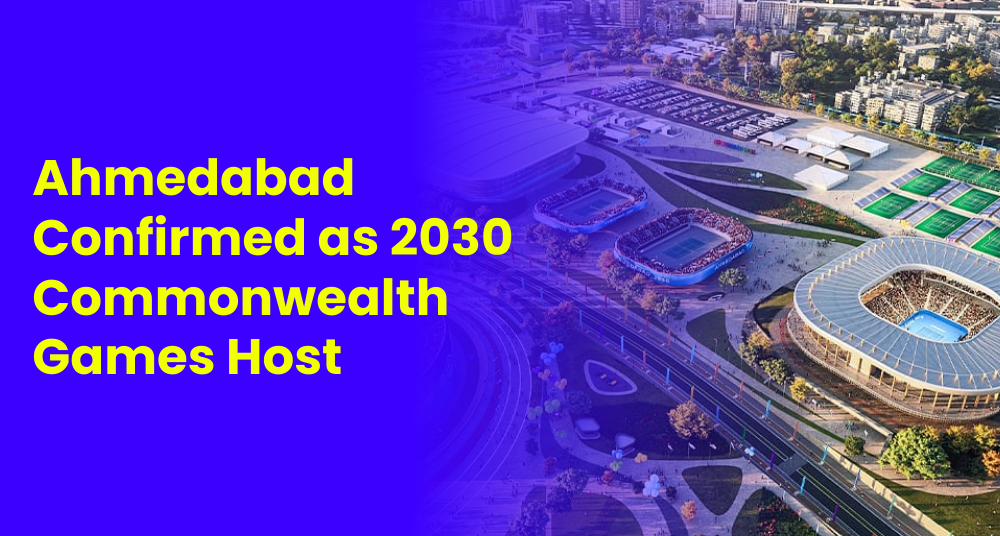On 26 November 2025, during the General Assembly of Commonwealth Sport in Glasgow, 74 member nations ratified the bid of Ahmedabad (also spelled Amdavad) — awarding it the rights to host the 2030 Commonwealth Games.
This marks a landmark moment: the 2030 Games will be the centenary edition of the Commonwealth Games (100 years since the first Games in 1930), and will bring the multi-sport event back to India for the first time since the 2010 Games in New Delhi.
The decision follows a competitive evaluation and a final vote, in which Ahmedabad was chosen over rival candidate Abuja (Nigeria).
The formal ratification underscores the global sporting community’s confidence in India’s infrastructure, ambition, and readiness to deliver a world-class Games.
Why Ahmedabad Won — Bid Strength & Infrastructure Readiness
Strong Bid Backed by Infrastructure & Vision
- The bid was formally submitted by the Government of India & Government of Gujarat, and cleared by the Union Cabinet in August 2025.
- Ahmedabad’s proposition rested on a compact, sustainable Games model: leveraging existing world-class venues (stadia, arenas), robust transport networks, accommodation, and urban infrastructure — reducing the need for large-scale new construction.
- The plan aligns with modern “Games-Reset” principles focusing on affordability, inclusivity (including para-sports), sustainability, and long-term legacy rather than unsustainable expansion.
Already-Established Facilities
One key factor is existing sports infrastructure — especially the presence of the global-famous Narendra Modi Stadium (the world’s largest cricket stadium by capacity), which bolsters confidence in Ahmedabad’s capability to manage big crowds and major events.
Beyond this, Gujarat has laid out plans for multiple stadiums, sports complexes, residential facilities, and supporting infrastructure — anticipating a surge in demand in the lead-up to 2030.
What to Expect: Games Format, Sports, and Timeline
2030 Commonwealth Games: Basic Facts
- Official Name: 24th Commonwealth Games (Centenary Edition) — “Amdavad 2030”
- Host City: Ahmedabad, Gujarat, India
- Significance: 100-year commemoration of the Commonwealth Games, first held in 1930.
- Return of Games to India: First since 2010 (New Delhi) — marking India’s re-entry into hosting major multi-sport global events.
Expected Sports & Disciplines
According to the bid and early official communication, the 2030 Games are expected to feature 15 to 17 sports/disciplines. Already confirmed or strongly proposed sports include:
- Athletics & Para-Athletics
- Swimming & Para-Swimming
- Table Tennis & Para-Table Tennis
- Bowls & Para-Bowls
- Weightlifting & Para Powerlifting
- Artistic Gymnastics
- Netball
- Boxing
Other sports under review (or proposed) include — depending on final approval: Archery, Badminton, 3×3 Basketball (and wheelchair 3×3), Beach Volleyball, T20 Cricket, Cycling, Diving, Hockey, Judo, Rhythmic Gymnastics, Rugby Sevens, Shooting, Squash, Triathlon & Para-Triathlon, Wrestling. Hosts may also propose up to two additional disciplines.
This expanded programme — compared to the scaled-down 2026 Games — reflects India’s ambition to deliver a full-fledged, athlete-rich centenary Games, blending tradition and modern sport demands.
What This Win Means for India & Ahmedabad?
Global Recognition & Sporting Prestige
- With 2030 CWG in Ahmedabad, India reinforces its credentials as a host of world-class international sporting events. This could strengthen its future bids — for example, the 2036 Summer Olympics.
- For the global Commonwealth sporting community — this centenary Games symbolically bridges heritage (100 years since first Games) with renewed ambition and modern scale.
Urban Renewal & Infrastructure Boost for Ahmedabad/Gujarat
- The preparations for CWG 2030 are expected to trigger major development projects across the Ahmedabad–Gandhinagar region: new sports venues, upgraded transport (airports, roads, public transit), hotels, residential facilities, and supportive urban infrastructure.
- Estimates suggest creation of 30,000+ jobs, in construction, hospitality, services — providing an economic boost and long-term opportunities.
- The idea is to build legacy infrastructure — not “white elephants” — embedding sustainable facilities usable beyond 2030 by local communities, sportspersons, and for future events.
Sporting Culture, Youth & Inclusive Growth
- The Games will offer Indian athletes — across elite and grassroots levels — an opportunity to showcase talent on home soil. With para-sports being integral, the event could boost inclusivity and awareness of adaptive sports.
- For India’s youth, the prospect of world-class facilities and global exposure can inspire participation across sports beyond cricket, helping diversify sporting culture.
- The timing also aligns with India’s long-term goals — “Viksit Bharat 2047” — combining sports development with national growth, infrastructure, and global image.
Challenges & What Needs to be Done
While the announcement is historic and promising, delivering the 2030 Commonwealth Games successfully will require careful planning and execution. Some of the key challenges and tasks ahead:
- Speedy but Sustainable Infrastructure Build-out: Though Ahmedabad already has strong venues, executing upgrades, building new ones (if required), ensuring athlete villages, accessibility, transport links — all within timeframe — will need disciplined project management.
- Legacy Planning: Avoiding underutilized “white-elephant” venues — must ensure facilities remain useful post-Games (community sports, training centers, events).
- Logistics, Security & Public Services: Handling large influx of athletes, officials, spectators — ensuring transport, accommodation, health, security, crowd management — especially given India’s population density and urban challenges.
- Inclusivity & Sustainability: Ensuring para-sports access, equitable athlete representation, environmental concerns (waste, emissions), and long-term social impact.
- Balancing Costs vs Benefits: Managing budget and spending prudently — while ensuring value for public funds and delivering a Games that meets global standards.
What to Watch Between Now and 2030?
Here’s a glance at the upcoming milestones and what observers, fans, policymakers, and athletes should keep an eye on:
| Timeline / Area | What to Watch / Expect |
| 2025–2027 | Detailed Games roadmap & master plan: final list of venues, infrastructure projects, urban-renewal plans, accommodation, transport upgrades, environmental & sustainability plans. |
| 2026–2028 | Pre-Games trials & smaller international/national level sporting events in Ahmedabad to test infrastructure, logistics, readiness. |
| 2028–2029 | Athlete-village readiness, test events, volunteer & staff recruitment/training; local community engagement & sports outreach programs. |
| 2029 | Final official Games schedule; ticketing, broadcasting, security & transport plans; publicity campaigns; legacy planning finalisation. |
| 2030 (Games year) | Delivery of Games — opening & closing ceremonies; hosting ~ 15–17 sports; ensuring smooth operations, participant experience, public & athlete safety. |
| Post-2030 | Legacy utilization: community sports programs, training centers, youth development, leveraging facilities for future global events (e.g. 2036 Olympics bid). |
Broader Significance — What 2030 CWG Signals for India & Global Sport
- The 2030 CWG represents a rebirth of multi-sport mega-events in India after a long gap — offering a chance to correct past mistakes and set a new benchmark.
- It could anchor India as a sports-hosting powerhouse in Asia, capable of handling large global events with scale, ambition, and cultural flair.
- By integrating para-sports, sustainability, heritage, and youth-driven talent development — it may redefine how global multi-sport events evolve in the 21st century.
- For the wider Commonwealth community, a successful Centenary CWG in Ahmedabad could renew trust in the relevance, spirit, and future of the Games beyond heritage symbolism.
Conclusion
The decision to award the 2030 Centenary Commonwealth Games to Ahmedabad is nothing short of a historic milestone — both for India and the wider Commonwealth sporting fraternity. It marks a new chapter: one that blends tradition (100-year legacy) with modern ambition, infrastructure, inclusivity, and global aspiration.
If executed well, the 2030 Games could become a landmark for sporting excellence, urban transformation, social impact, and national pride. For Ahmedabad, Gujarat, and India, it’s an opportunity to showcase not just athletic prowess — but readiness to host the world, united by sport, culture, and a vision for the future.
2030 is still some years away — but the launch of this journey starts now.
FAQs
Where will the 2030 Commonwealth Games be held?
Ahmedabad, Gujarat, India.
Why was Ahmedabad chosen to host the Games?
Because it offered a strong bid backed by existing infrastructure, readiness, and a vision aligned with sustainability and legacy — found favourable by the evaluation committee.
When will the 2030 Commonwealth Games take place?
In the year 2030 — the event is scheduled to be the centenary edition of the Games.
How many sports are expected to feature at the 2030 Games?
15 to 17 sports disciplines are expected to be part of the Games.
Has India hosted the Commonwealth Games before?
Yes — previously, the Games were hosted in New Delhi in 2010.
What’s special about the 2030 edition of the Commonwealth Games?
The 2030 Games will be the centenary edition of the Commonwealth Games — celebrating 100 years since the first Games held in 1930.
Related Blog: Commonwealth Games History






What do you think?
It is nice to know your opinion. Leave a comment.